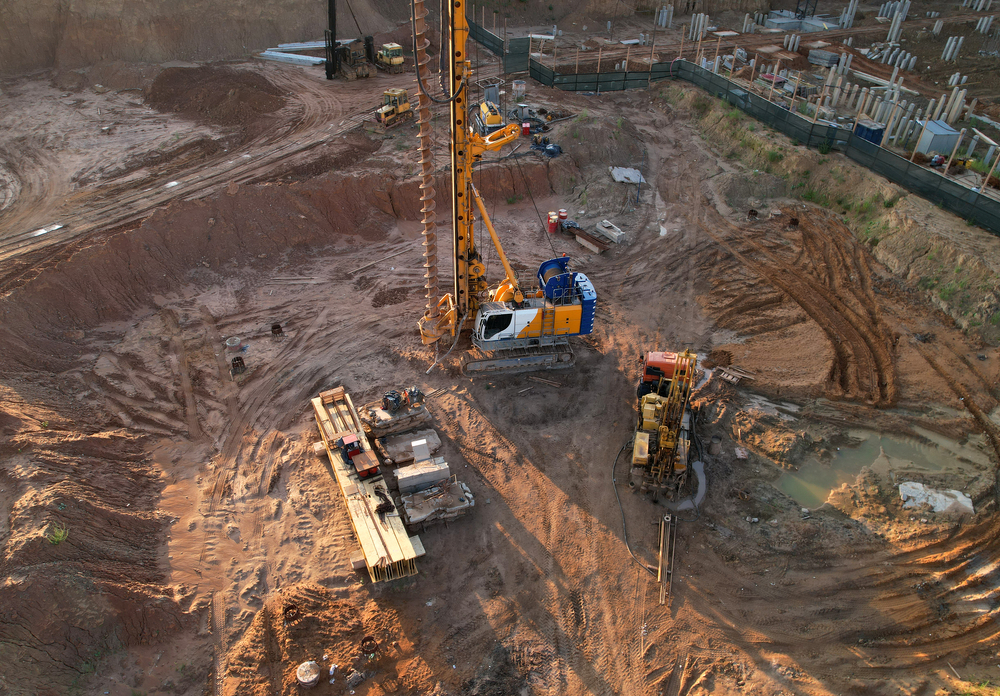Top Guidelines Of Geotheta
Top Guidelines Of Geotheta
Blog Article
Getting The Geotheta To Work
Table of Contents9 Simple Techniques For GeothetaGeotheta Fundamentals ExplainedAn Unbiased View of GeothetaAn Unbiased View of GeothetaThe Main Principles Of Geotheta

They carry out site examinations, accumulate samples, execute laboratory examinations, and evaluate data to review the suitability of the ground for building jobs - Engineer of Record. Based upon their findings, geotechnical designers give recommendations for foundation layout, incline security, retaining structures, and reduction of geotechnical threats. They team up with various other experts, such as engineers, structural designers, and construction teams, to make sure that geotechnical factors to consider are integrated into the overall task style and application
By analyzing the actions and homes of dirt and rock, they can determine possible geotechnical hazards such as landslides, dirt settlement, or incline instability. Their know-how helps prevent failings or crashes that can endanger lives and property. Here are some comprehensive obligations and obligations of a geotechnical engineer: Website Investigation: Geotechnical designers conduct website examinations to gather information on subsurface conditions.
They analyze the data to comprehend the properties and habits of the dirt and rock, including their toughness, permeability, compaction characteristics, and groundwater problems. Geotechnical Analysis and Design: Geotechnical engineers examine the data collected throughout website investigations to examine the security and suitability of the website for building tasks. They execute geotechnical calculations and modeling to evaluate variables such as bearing capability, settlement, slope stability, side planet pressures, and groundwater circulation.
The Ultimate Guide To Geotheta
Foundation Design: Geotechnical engineers play an important role in developing structures that can safely sustain the designated framework. They analyze the dirt problems and tons requirements to establish the proper structure type, such as superficial structures (e.g., footings), deep foundations (e.g (https://myanimelist.net/profile/geotheta)., piles), or specialized techniques like soil improvement. They think about elements such as negotiation limitations, bearing capacity, and soil-structure interaction to establish optimal foundation designs
They assess construction plans, screen site activities, and carry out area assessments to verify that the design referrals are complied with. If unexpected geotechnical concerns develop, they evaluate the scenario and offer referrals for remediation or changes to the layout. Danger Evaluation and Mitigation: Geotechnical engineers examine geotechnical threats and dangers connected with the task site, such as landslides, liquefaction, or dirt erosion.

Partnership and Interaction: Geotechnical engineers function closely with other experts associated with a job, such as engineers, architectural designers, and construction groups. Reliable interaction and collaboration are vital to incorporate geotechnical considerations right into the total job layout and construction process. Geotechnical engineers supply technical knowledge, answer inquiries, and make certain that geotechnical demands are met.
The Facts About Geotheta Uncovered
Below are some kinds of geotechnical designers: Foundation Designer: Structure engineers specialize in developing and analyzing foundations for frameworks. They evaluate the soil conditions, load requirements, and site qualities to figure out one of the most proper structure kind and style, such as shallow structures, deep foundations, or specialized techniques like pile foundations.
They assess the variables affecting slope security, such as soil residential properties, groundwater conditions, and slope geometry, and develop techniques to stop slope failures and mitigate risks. Earthquake Designer: Quake engineers specialize in analyzing and designing structures to withstand seismic pressures. They examine the seismic hazard of a website, evaluate dirt liquefaction capacity, and create seismic style standards to make sure the safety and durability of structures throughout earthquakes.
They carry out field testing, collect examples, and examine the collected information to characterize the dirt buildings, geologic formations, and groundwater problems at a site. Geotechnical Instrumentation Designer: Geotechnical instrumentation engineers concentrate on surveillance and determining the actions of dirt, rock, and frameworks. They mount and maintain instrumentation systems that monitor aspects such as soil negotiation, groundwater levels, incline movements, and structural variations to evaluate efficiency and provide early cautions of prospective concerns.
Geotheta Things To Know Before You Get This
They carry out tests such as triaxial examinations, loan consolidation examinations, direct shear examinations, and permeability tests to gather information for geotechnical analysis and style. Geosynthetics Designer: Geosynthetics designers specialize in the style and application of geosynthetic products, such as geotextiles, geogrids, and geomembranes. They make use of these products to boost soil stability, reinforce slopes, offer drain options, and control disintegration.
They have a tendency to be investigative individuals, which means they're intellectual, reflective, and investigative. They are interested, systematic, sensible, logical, and rational. Some of them are also social, implying they're kind, charitable, participating, client, caring, handy, understanding, skillful, and pleasant - Engineer of Record.
In the workplace environment, geotechnical engineers utilize specialized software application devices to perform estimations, create layouts, and evaluate data. They prepare records, evaluation task requirements, communicate with customers and staff member, and coordinate task tasks. The office setup provides a helpful environment for study, analysis, and collaboration with other experts involved in the job.
A Biased View of Geotheta
They regularly check out task sites to conduct website investigations, assess geotechnical conditions, and gather data for analysis. These visits involve traveling to different places, in some cases in remote or tough surfaces. Geotechnical engineers might do dirt tasting, conduct visit this page tests, and monitor building tasks to guarantee that the geotechnical aspects of the task are being applied properly.
Geotechnical engineers also function in specialized geotechnical labs. In these centers, they perform experiments, perform examinations on dirt and rock samples, and analyze the engineering homes of the products. Geotechnical laboratory engineers work thoroughly in these atmospheres, taking care of screening devices, operating instruments, and taping information. They team up with other research laboratory personnel to ensure exact and trusted testing outcomes.
Report this page